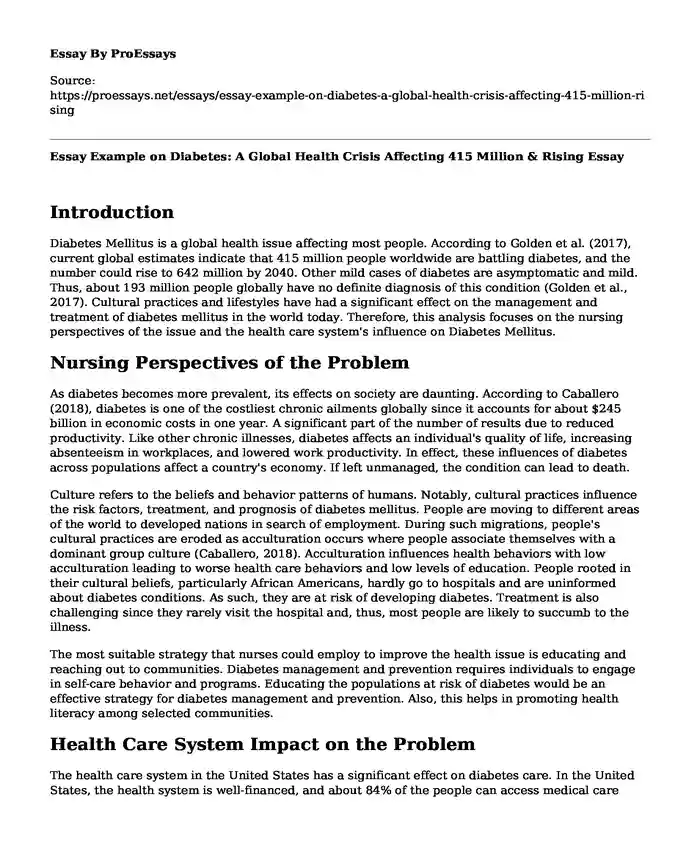Introduction
Diabetes Mellitus is a global health issue affecting most people. According to Golden et al. (2017), current global estimates indicate that 415 million people worldwide are battling diabetes, and the number could rise to 642 million by 2040. Other mild cases of diabetes are asymptomatic and mild. Thus, about 193 million people globally have no definite diagnosis of this condition (Golden et al., 2017). Cultural practices and lifestyles have had a significant effect on the management and treatment of diabetes mellitus in the world today. Therefore, this analysis focuses on the nursing perspectives of the issue and the health care system's influence on Diabetes Mellitus.
Nursing Perspectives of the Problem
As diabetes becomes more prevalent, its effects on society are daunting. According to Caballero (2018), diabetes is one of the costliest chronic ailments globally since it accounts for about $245 billion in economic costs in one year. A significant part of the number of results due to reduced productivity. Like other chronic illnesses, diabetes affects an individual's quality of life, increasing absenteeism in workplaces, and lowered work productivity. In effect, these influences of diabetes across populations affect a country's economy. If left unmanaged, the condition can lead to death.
Culture refers to the beliefs and behavior patterns of humans. Notably, cultural practices influence the risk factors, treatment, and prognosis of diabetes mellitus. People are moving to different areas of the world to developed nations in search of employment. During such migrations, people's cultural practices are eroded as acculturation occurs where people associate themselves with a dominant group culture (Caballero, 2018). Acculturation influences health behaviors with low acculturation leading to worse health care behaviors and low levels of education. People rooted in their cultural beliefs, particularly African Americans, hardly go to hospitals and are uninformed about diabetes conditions. As such, they are at risk of developing diabetes. Treatment is also challenging since they rarely visit the hospital and, thus, most people are likely to succumb to the illness.
The most suitable strategy that nurses could employ to improve the health issue is educating and reaching out to communities. Diabetes management and prevention requires individuals to engage in self-care behavior and programs. Educating the populations at risk of diabetes would be an effective strategy for diabetes management and prevention. Also, this helps in promoting health literacy among selected communities.
Health Care System Impact on the Problem
The health care system in the United States has a significant effect on diabetes care. In the United States, the health system is well-financed, and about 84% of the people can access medical care (Golden et al., 2017). The remaining 16% who can hardly access medical care belong to poor and low-class families (Golden et al., 2017). For this group, the rate of mortality due to diabetes is high. Besides, the 16% who can access medical care hardly know about the processes of managing diabetes and the prevention measures, which imply that they are at risk of leading a lifestyle that predisposes them to the condition (Golden et al., 2017). Access to care, even among low-class families, is quite more comfortable in the United Kingdom since healthcare costs are relatively low as opposed to the United States. The only issue in the UK's health system is the limited responsive time among doctors meaning the physicians respond to the health conditions of the staff of time.
Conclusion
Diabetes is a global health challenge resulting due to a poor lifestyle. The condition affects people from all backgrounds and cultures, but some cultural practices predispose some to the state. African Americans are prone to diabetes since they have limited knowledge of prevention measures as opposed to whites. The conclusion derived is that diabetes is an issue that is influenced by individuals' lifestyle practices but is also affected by the health care systems of countries. The different health systems in the UK and the USA have different diabetes care results and access to health services. Health services in the UK are cheaper than in the USA. Thus, more people in the UK can access health care, unlike in the USA.
References
Caballero, A. E. (2018). The “A to Z” of managing type 2 diabetes in culturally diverse populations. Frontiers in Endocrinology, 9, 479-512. https://doi.org/10.3389/fendo.2018.00479
Golden, S. H., Maruthur, N., Mathioudakis, N., Spanakis, E., Rubin, D., Zilbermint, M., & Hill-Briggs, F. (2017). The case for diabetes population health improvement: Evidence-based programming for population outcomes in diabetes. Current Diabetes Reports, 17(7). https://doi.org/10.1007/s11892-017-0875-2
Cite this page
Essay Example on Diabetes: A Global Health Crisis Affecting 415 Million & Rising. (2023, Oct 25). Retrieved from https://proessays.net/essays/essay-example-on-diabetes-a-global-health-crisis-affecting-415-million-rising
If you are the original author of this essay and no longer wish to have it published on the ProEssays website, please click below to request its removal:
- Healthcare Study Analysis Example
- Term Paper Example on Public Health: Orem's Self-care Model for Patients with Diabetes
- Paper Example on Patient Teaching Plan
- Family Inquiry Reflection Paper Example
- Early Life Probiotics for Improving Postnatal Outcomes - Research Paper
- Healthy People 2020: Tracking US Health Through LHIs - Essay Sample
- Mental Health Challenges in the COVID-19 Pandemic: 45% of US Adults Affected - Essay Sample







